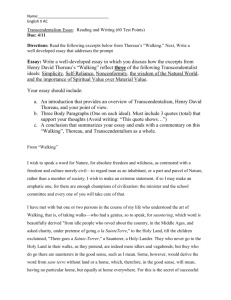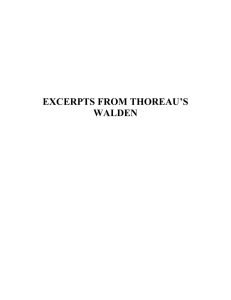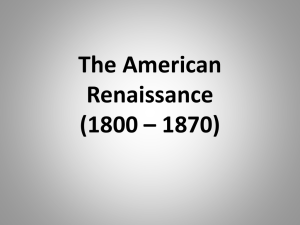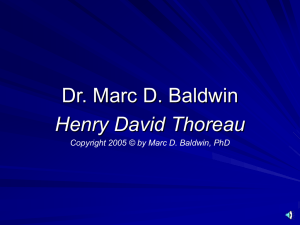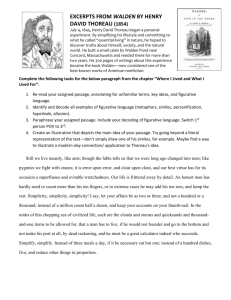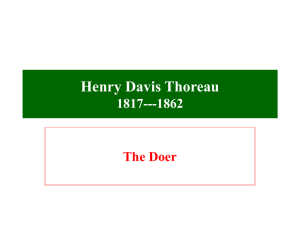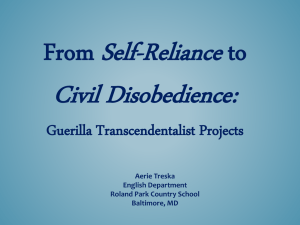religious beauty
advertisement
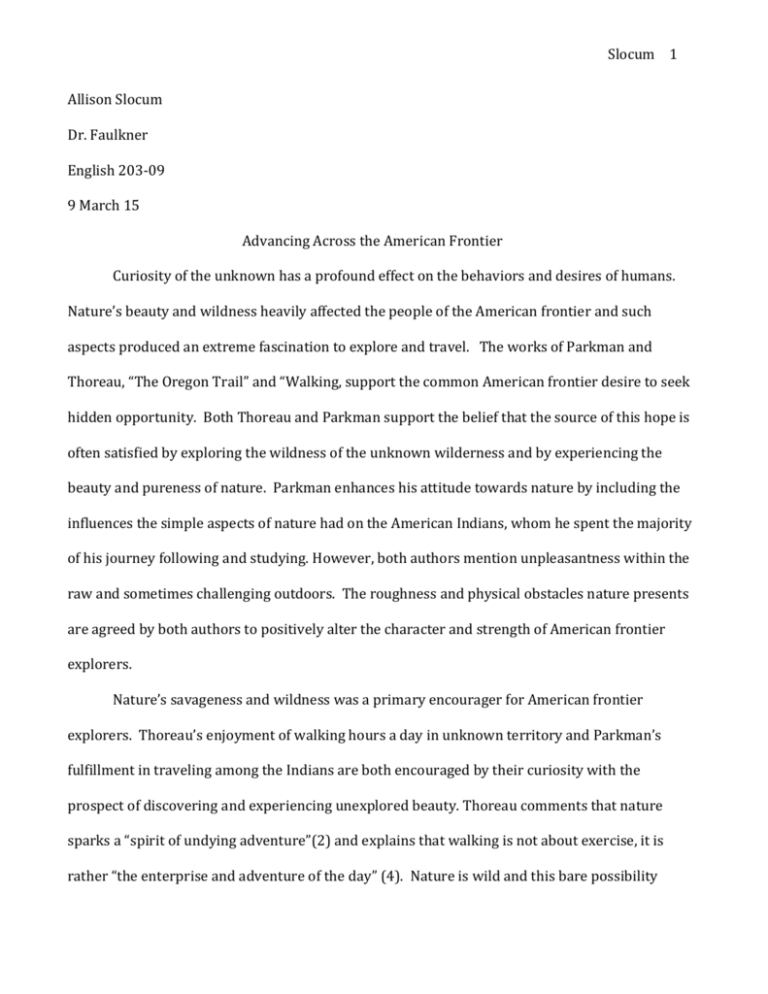
Slocum 1 Allison Slocum Dr. Faulkner English 203-09 9 March 15 Advancing Across the American Frontier Curiosity of the unknown has a profound effect on the behaviors and desires of humans. Nature’s beauty and wildness heavily affected the people of the American frontier and such aspects produced an extreme fascination to explore and travel. The works of Parkman and Thoreau, “The Oregon Trail” and “Walking, support the common American frontier desire to seek hidden opportunity. Both Thoreau and Parkman support the belief that the source of this hope is often satisfied by exploring the wildness of the unknown wilderness and by experiencing the beauty and pureness of nature. Parkman enhances his attitude towards nature by including the influences the simple aspects of nature had on the American Indians, whom he spent the majority of his journey following and studying. However, both authors mention unpleasantness within the raw and sometimes challenging outdoors. The roughness and physical obstacles nature presents are agreed by both authors to positively alter the character and strength of American frontier explorers. Nature’s savageness and wildness was a primary encourager for American frontier explorers. Thoreau’s enjoyment of walking hours a day in unknown territory and Parkman’s fulfillment in traveling among the Indians are both encouraged by their curiosity with the prospect of discovering and experiencing unexplored beauty. Thoreau comments that nature sparks a “spirit of undying adventure”(2) and explains that walking is not about exercise, it is rather “the enterprise and adventure of the day” (4). Nature is wild and this bare possibility Slocum 2 enticed exploration not only amongst both Thoreau and Parkman, but people of the American frontier in general. Thoreau also believes the wildness of nature is a part of it’s beauty and he pity’s a student confined to the classroom, who otherwise exposed to nature would “grow faster, both intellectually and physically”(28). This suggests that he believes nature has an unending source of knowledge to offer humans that explore its beauty and are enticed by its wildness. Thoreau also seeks the road less traveled which he feels is both “more unexhausted and richer” (11). Untamed land was way more appealing in that it suggested unexplored opportunity to explorers such as Thoreau. The American frontier idea of hidden opportunity was closely linked with the desire to achieve manifest destiny. Thoreau associates the west with more untamed and wild land and says, “Eastward I go only by force; but westward I go free.” (11) The west, suggested for Thoreau and other American explorers, land that was untamed and full of wild beauty, which was nothing but exciting to their interests. He also mentions that going west enabled Columbus to discover the New World and suggests that all founders and explorers have “drawn their vigor from a similar wild source” (17). Thoreau says, “the most alive is the wildest” (19). Humans are motivated by hope for discovering hidden opportunity within the unknown. The wild gives explorers motivation to seek greater, more self-determined life. Thoreau states that even in literature “it is only the wild that attracts us. Dullness is but another name for tameness” (25). This same suggestion undoubtedly applied to the mindset of American frontier explorers. In “The Oregon Trail”, Parkman adds that the “prairie is a strange place” (77) full of rough men (81). However, he still continues on his journey along with his team. His desire to witness the savageness and wildness of Indian life, and particularly Indian “War Parties, Slocum 3 overrides any fear associated with the dangers of the wild and unknown aspects of nature. The untamed nature, and particularly the savageness of the Indians, is a main reason why Parkman and the other emigrants of the American frontier continue on their journeys, explorations, and conquests. The beauty that enticed the explorers of the American frontier, along with Parkman and Thoreau, was found in both the appealing scenery of nature and also the freedom of its boundless possibilities. The full freedom nature allows for, which no amount of money could purchase, is achieved by “regarding man as an inhabitant, or a part of Nature, rather than a member of society” (Thoreau 2). Thoreau associates people that destroy nature, to either build or survey land, with the devil; and people who respect nature with angels (6). This suggests a sort of religious holiness regarding the beauty and pureness of nature that entices explorers. Thoreau spends four hours a day walking through the woods and believes that “roads are made for horses and men of business” (8). Thoreau is insinuating that nature allows an unlimited freedom for an individual to make his or her own path or destination in life (8). Thoreau also compares the beauty of nature to literature. Its visual appeal has an everlasting and reoccurring effect that leaves impressions of people much like the events of a well-written novel (10). Thoreau founds his greatest fascination in nature with the foggy swamps, which he says are the “jewels” of the outdoors (20). Although he admits they are not so visually appealing, he feels that the beauty of swamps is lays in their purity and naturalness. There are not very many man-made swamps, and for this reason, swamps suggest untouched land full of life in which animals and plants are often undisturbed. Slocum 4 Thoreau enhances the physical beauty of nature by personifying nature, which he states, “has a personality so vast and universal that we have never seen one of her features” (31). He also refers to nature as the Holy Land and mentions nature’s ability to “light up our whole lives with a great and awakening light”(36). The effect of nature produces a profoundly positive effect to all forms of life on earth, and especially people of the American frontier. Parkman frequently explains his motivation by the beauty of nature. He was very ill and weak throughout most of his journey, but his hope to discover something within the beauty of nature allowed him to persevere through the pain. After barely being able to climbing to the peak of a mountain, Parkman achieves success and is able to witness a beautiful view of a prairie down below, which he describes “like a serene and tranquil ocean” (233). A common motivation among people of the American frontier was the interest in enjoying the pureness in the beauty of nature. Parkman feeds his desire to explore the unknown and beauty of nature by following Indian tribes through the mountains. He says, “I had come to the country most exclusively with a view of observing the Indian character” (106). He also mentions that he is unaware of their superstitions and daily life in the mountains, but he says that he “felt an eager desire to penetrate their hidden recesses” (142). His fascination with the culture and life of Indians stems from the trust and encouragement they seek from nature in their daily lives. He says that Indians have “wild hearts” that allow them to become so knowledgeable of the ways of nature. The Indians compete for territory in desirable areas of nature in order to gain power over other bands of Indians in battles referred to as “War Parties”. A similar sense of competition, enticed by the beauty of nature, can be seen within the general population of people of the American frontier. Parkman spends the majority of his travels attempting to Slocum 5 witness one of these savage battles. Parkman and his crew continue to travel to witness a war party despite the risks; their curiosity to experience the thrill of the unknown overrides all other fears (165). While living amongst and observing the daily life of the natives, Parkman remarks on the Indians’ common motivation that can be attributed to their respect for the beauty and savageness of nature. The chief Indian of the Ogadallah tribe, Mene-Seela, engages in worship towards a pine tree. Parkman says, “the intellect of an Indian can embrace the idea of an all wise, all-powerful Spirit” (232). Native American Indians put a very heavy importance of religion, as they believed it to be the answer to an individual’s unknown purpose in life. All daily activities associated with traditional Indian culture “was created in the process of honoring and celebrating the gods or spirits” (Kowtko 108). This suggests that the Indians believe that nature’s beauty and wildness is so powerful it can be looked to for religious or spiritual guidance. The ruggedness and physical challenges nature presents only strengthen a person in the long run. Thoreau says, “living much out of doors, in the sun and wind, will no doubt produce a certain roughness of character—will cause a thicker cuticle to grow over some of the finer qualities of our nature” (5). Nature has the ability to refines one’s character through adversity; an individual in the wild is forced to build their strength and endurance both intellectually and physically in order to survive and maintain their journey towards whatever opportunity he or she is seeking. However, nature does not discriminate and its challenges do not take empathy on anyone and “the frontier has no place for ‘tender’ feelings” (Meola). Thoreau mentions drearily “muggy nights and seasons of gloom” in which he struggles with but he finds the fight to be rewarding in the end because he understands that these struggles Slocum 6 and hardships allow him to grow as a person and as an explorer (30). Parkman also remarks on the advantages of hardship among the wilderness. He mentions “pitiless, insufferable heat” of the desert that he was able to overcome until he was able to seek refuge at the rare site of a fresh-water stream (163). The beauty and unknown of nature encouraged the American frontier desire of hidden opportunity. Explorers across the continent were forced to overcome obstacles within the roughness of nature, while seeking knowledge, experiences, and territorial gain. Parkman and Thoreau support all of these ideas in their travels within the savage outdoors. Slocum 7 Works Cited Kowtko, Stacy. Nature And The Environment In Pre-Columbian American Life. Westport, Conn: Greenwood Publishing Group, 2006. eBook Collection (EBSCOhost). Web. 10 Mar. 2015. Meola, Frank M. "A Passage Through `Indians': Masculinity And Violence In Francis Parkman's The Oregon Trail." Atq 13.1 (1999): 5. Humanities International Complete. Web. 10 Mar. 2015. Thoreau, Henry David, and John Wawrzonek. Walking. Berkeley, CA: Nature, 1993. Print. Parkman, Francis, and William Ellery Leonard. The Oregon Trail of Francis Parkman. Boston: Ginn, 1910. Print.

